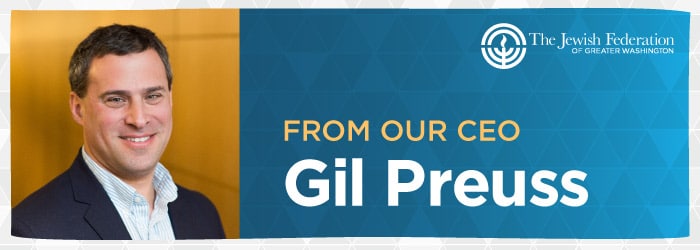-
10 May 2019

“Well-meaning people used to say that a Jewish state would be an answer to all Jewish questions. In truth, however, the State of Israel is a challenge to many of our answers. To be involved in the life of Israel is to be in labor.” – Abraham Joshua Heschel, Israel: An Echo of Eternity
As a young child, I remember going to the roof of my apartment building in Jerusalem to watch the Israeli Air Force flyover. They would come so close that I would duck. It was 1973, and Israel was celebrating Yom Ha’atzmaut and its 25th birthday. The scene was both jubilant and defiant. People felt an immense sense of pride in the Jewish state and were more determined than ever to counter the threats to its peace and security.
Looking back now, I did not appreciate how young Israel was at the time, and what a tremendous change in history it was to have a Jewish state to call our own. I would also not understand the threat that Israel faced just a few months later during the Yom Kippur War as it defended itself against a significant surprise attack.
As we think about it today, the existence of a Jewish state seems natural, but we have had a sovereign homeland for only a relatively short time. As Dr. Tal Becker of the Shalom Hartman Institute has pointed out, for most of our history, Jews have lived in exile. Or consider that, as Avraham Infeld describes, before Israel, the term most associated with the word “Jewish” was “refugee.”
More than 45 years after that day in Jerusalem, Israel is still very young and continues to evolve, and as we have seen this past week, continues to face ongoing threats. Of course, Israel has also changed in ways the founders could have only dreamed about. It serves as a strong and capable ally on the global stage and has become known the world over as the Start-Up Nation, leading in industries across science, health, technology, art, and more.
Like every democratic state, Israel is also grappling with how to live up to its ideals. It is true that when any country goes about the work of governing, it rarely lives up to its loftiest goals. Still, during my most recent trip to Israel as part of Federation’s Israel YOUR Way Mission, Rabbi Dr. Donniel Hartman spoke to our group about how crucial it is that the “Start-Up Nation” also serve as a “values nation.” He described the ongoing struggle to define what it means to be a modern, Jewish democratic state for all of its citizens.
Israel also plays a unique role relative to the global Jewish community. In addition to being an independent state, Israel carries with it the Jewish historical narrative. Israel is navigating how to be a country for its citizens while simultaneously serving as a homeland for the Jewish people. At the same time, Jews around the world look to Israel as a critical component of their own Jewish values and identity, a vital link to Jewish tradition, and as a source of connection to a global Jewish people. We care about Israel’s actions within and outside of the country because, for so many, Israel represents our collective aspirations for who we want to be as people and as a community.
As Jewish life evolves, and as the American Jewish community and Israel change, Israel continues to be both a modern state and an expression of identity for the global Jewish community. For some, these two roles coincide and strengthen each other. For others, there is a discord between the two.
I would like to suggest that the tension between Israel’s roles is healthy and important for both Israel and the global Jewish community. As Heschel points out, Israel is not an answer to all Jewish questions but rather the catalyst for new questions that we must collectively address. What does it mean to be both a country for its citizens and an important expression of identity for Jews around the world? What does that mean for Israel and for global Jewry? What responsibilities do each hold for the other? How do those responsibilities shift over time?
At Federation, we recognize that we cannot answer these questions, but we can provide the space and support to wrestle with them together. Importantly, we want to give all those who are interested the opportunity to form a personal and meaningful connection with Israel. I have heard from countless community members how much their understanding of themselves shifted when they began to explore Israel on a deeper level.
I hope as we move forward and continue to define our relationship with Israel in the 21st century, that each and every community member feels welcome and empowered to join the conversation and to participate in our ongoing task of asking and answering new questions. This week, as we celebrate Israel’s 71st year of independence, I invite you to come learn, come discuss, and come build the future together with us.
Shabbat Shalom,
Gil
